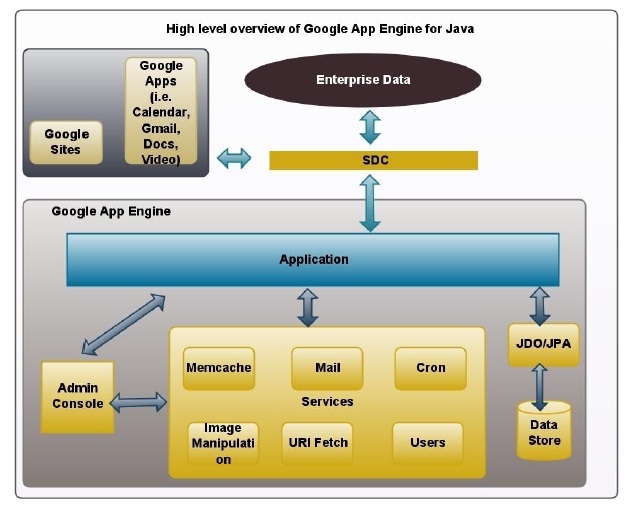





Published on Feb 14, 2025
Google App Engine was first released as a beta version in April 2008. It is a platform for developing and hosting web applications in Google-managed data centers. Google’s App Engine opens Google’s production to any person in the world at no charge.
Much like Google gives us all free email with an amazing amount of long term storage, we now have the ability to run the software that we write in Google’s data centers.
Google App Engine is cloud computing technology. Google App Engine is software that facilitates the user to run his web applications on Google infrastructure. It is more reliable because failure of any server will not affect either the performance of the end user or the service of the Google.It virtualizes applications across multiple servers and data centers. Other cloud-based platforms include offerings such as Amazon Web Services and Microsoft's Azure Services Platform.
Google App Engine lets you run your web applications on Google's infrastructure. App Engine applications are easy to build, easy to maintain, and easy to scale as your traffic and data storage needs grow. With App Engine, there are no servers to maintain: You just upload your application, and it's ready to serve your users.
You can serve your app from your own domain name (such as https://www.example.com/) using Google Apps. Or, you can serve your app using a free name on the appspot.com domain. You can share your application with the world, or limit access to members of your organization.
Google App Engine supports apps written in several programming languages. With App Engine's Java runtime environment, you can build your app using standard Java technologies, including the JVM, Java servlets, and the Java programming language—or any other language using a JVM-based interpreter or compiler, such as JavaScript or Ruby. App Engine also features a dedicated Python runtime environment, which includes a fast Python interpreter and the Python standard library. The Java and Python runtime environments are built to ensure that your application runs quickly, securely, and without interference from other apps on the system.
With App Engine, you only pay for what you use. There are no set-up costs and no recurring fees. The resources your application uses, such as storage and bandwidth, are measured by the gigabyte, and billed at competitive rates. You control the maximum amounts of resources your app can consume, so it always stays within your budget. App Engine costs nothing to get started. All applications can use up to 500 MB of storage and enough CPU and bandwidth to support an efficient app serving around 5 million page views a month, absolutely free. When you enable billing for your application, your free limits are raised, and you only pay for resources you use above the free levels.
Google App Engine makes it easy to build an application that runs reliably, even under heavy load and with large amounts of data. App Engine includes the following features:
persistent storage with queries, sorting and transactions
automatic scaling and load balancing
APIs for authenticating users and sending email using Google Accounts
task queues for performing work outside of the scope of a web request
scheduled tasks for triggering events at specified times and regular intervals
dynamic web serving, with full support for common web technologies

• You can develop your application for the Java runtime environment using common Java web development tools and API standards. Your app interacts with the environment using the Java Servlets standard, and can use common web application technologies such as Java Server Pages
The Java runtime environment uses Java 6. The App Engine Java SDK supports developing apps using either Java 5 or 6. The environment includes the Java SE Runtime Environment (JRE) 6 platform and libraries. The restrictions of the sandbox environment are implemented in the JVM. An app can use any JVM byte code or library feature, as long as it does not exceed the sandbox restrictions. For instance, byte code that attempts to open a socket or write to a file will throw a runtime exception.
Your app accesses most App Engine services using Java standard APIs. For the App Engine data store, the Java SDK includes implementations of the Java Data Objects (JDO) and Java Persistence API (JPA) interfaces. Your app can use the JavaMail API to send email messages with the App Engine Mail service. The java.net HTTP APIs accesses the App Engine URL fetch service.
App Engine also includes low-level APIs for its services to implement additional adapters, or to use directly from the application. See the documentation for the data store, memcache, URL fetch, mail, images and Google Accounts APIs. Typically, Java developers use the Java programming language and APIs to implement web applications for the JVM. With the use of JVM-compatible compilers or interpreters, you can also use other languages to develop web applications, such as JavaScript, Ruby.
| Are you interested in this topic.Then mail to us immediately to get the full report.
email :- contactv2@gmail.com |